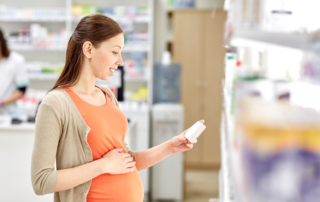Prenatal Folate Increases Child Brain Volumes, Improves Cognitive Development
The US Preventive Services Task Force (USPSTF) unequivocally recommends that ALL WOMEN who are either planning or capable of pregnancy take a DAILY SUPPLEMENT containing 0.4 TO 0.8 mg (400-800 µg) OF FOLIC ACID. While the most obvious benefit of prenatal use of folate is a significant reduction in risk of neural tube defects, other studies indicate that periconceptual use of folic acid reduces risk for other congenital malformations, including [...]
Clinical Update 2020: Duloxetine and Pregnancy
Women face difficult choices when deciding whether or not to continue psychiatric medications during pregnancy. For many years, we have typically recommended the older antidepressants, including the selective serotonin reuptake inhibitors or SSRIs such as fluoxetine (Prozac), citalopram (Celexa), and sertraline (Zoloft), because we had the most robust data on reproductive safety data for these medications. As time has moved along, we have seen more women taking some of these [...]
Weekly Roundup for FEBRUARY 21, 2020: Recent Publications in Women’s Mental Health
Every week we review the most recent publications in women’s mental health, covering topics related to premenstrual symptoms, perinatal mood and anxiety disorders, use of medications in pregnant and breastfeeding women, perinatal substance use, and menopausal mental health. In an article published in the Journal of Affective Disorders, Auger and colleagues looked at risk for cardiovascular disease in women who suffer from severe mood disorders. Researchers identified a cohort of [...]
Screening for Menopausal Depression: Are We Doing Enough?
Recent studies suggest that the burden of menopausal symptoms is greater than generally perceived. About 80% of women experience vasomotor symptoms (VMS) – hot flashes and night sweats — as they transition into the menopause phase. For many, the symptoms are manageable; however, a significant proportion of midlife women experience menopausal symptoms that negatively affect sleep, mood, and overall quality of life. The menopausal transition represents a time of increased [...]
Recruiting at CWMH: A Neurosteroid Intervention for Menopausal and Perimenopausal Depression
Women are twice as likely as men to have major depressive disorder (MDD) during their lifetimes, and women are particularly at risk during the menopausal transition (including perimenopause and early menopause), which can last many years. Typically starting after age 40, this period is characterized by fluctuations in hormones and various physical symptoms like hot flashes, as well as mood symptoms. Although some treatments are available, many women would like [...]
In NYC, A Home Visiting Program Addresses the Mental Health of New Mothers
In the United Kingdom (UK), health visitors (professionals who have at least three years of general nursing education and one year of specialist training) provide home visits to all women after birth as part of universal child health surveillance. These health visitors routinely screen all new mothers for depression and provide home-based treatment to mothers with mild to moderate depression. Depressed mothers are offered an intervention called a “Listening Visit”, [...]






